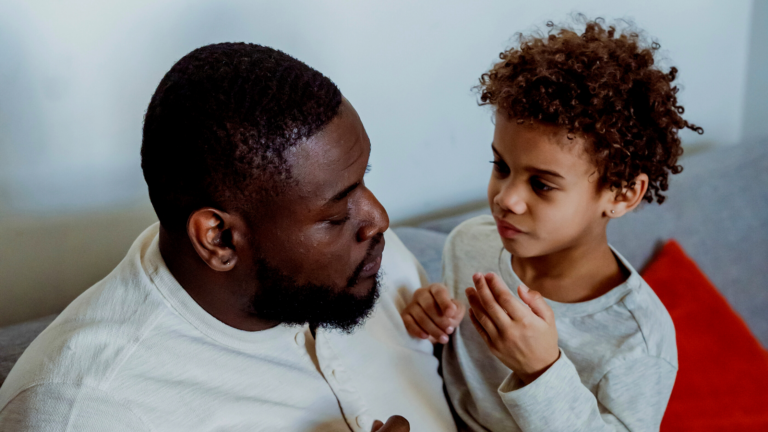We’ve provided free Parent Conversation Starters to help parents begin intentional dialogue about sexuality with children and teens. Each Starter includes step-by-step instructions for parents to (1) prepare for conversation and (2) initiate conversation, broken down by age-group.
These starters are just that–starters. These are not meant to be one-and-done conversations, but rather a place to begin ongoing conversation. We know these are difficult conversations, which is why we’ve created an on-demand Parent Course, designed to give parents all the tools they need to have compassionate and theologically accurate conversations about sexuality with their kids throughout childhood.
(1) Prepare for Conversation: get familiar with the topic
Topic Summary: Women experience sexuality differently than men; it’s not uncommon for teen girls to feel confusion or shame surrounding their sexuality.
Parents, read Equip’s blog post titled “Kiss the Girl.” As you read, pause and reflect on the following questions:
-
Lindsey shared that she had almost no idea what sex was until she was 12 and thought she’d accidentally had sex with a male friend. Have you taken the time to talk to your young child about sex (in age-appropriate ways)? Are you communicating the good and beautiful aspects of sex, along with the dangers?
-
How are you helping your children (particularly your daughters) fight against body shame?
-
How are you making space for and encouraging your teen to come to you with questions or concerns about sexuality? Are your actions/words helping your teen further suppress or ignore their attractions, or are they inviting your teen into conversation?
-
Imagine that one day your teen comes to you and admits to experimenting sexually. What would your reaction be? Would your reaction be different if your teen admitted to experimenting with someone of the same sex?
(2) Initiate Conversation: ask good questions
With your deepened understanding of the topic, initiate conversation with children and teens with age-specific questions.
Conversation about LGBT+ topics should take place within a broader conversation about the need for everyone to steward their sexualities in God-honoring ways. Here’s a brief summary of what all children need to know about sexual stewardship–please ensure your children have grasped these foundational truths before exploring sexual minority-specific conversations:
-
God created all of us to enjoy human intimacy in the context of life-long, lived-in family, and we find that family through one of the vocations God created: Christian marriage or vocational singleness. As our kids enter their young adult years, they will begin to discern with (ask) God which vocation He has given to them.
-
Humanity’s sin has bent and broken the goodness of everything God created. We see the results of this bending and breaking everywhere. We are all broken in the area of sexuality, and none of us can do intimacy or family perfectly. Encourage your child to share with you when they discover where broken sexuality is part of their story.
-
We are still able to find beauty and goodness and flourish in this broken world because God offers us His wisdom through the Bible and the Church. When we follow God’s wisdom, we’ll find the greatest joy, the deepest meaning, and the richest belonging in this life.
Conversation Starter for Ages 2-7
The best way to love your daughter who is questioning her sexuality is to be proactive instead of reactive. Introducing early the goodness of God’s design for sex while still acknowledging the possibility of experiencing same-sex attractions and the normalcy of sexual identity confusion among girls is a good place to start. Addressing fear and shame by establishing the foundation of God’s and parental unconditional love is key.
This is where we’ll start with ages 2-5: God loves you unconditionally (as the Jesus Storybook Bible says, “God loves his children with a Never Stopping, Never Giving Up, Unbreaking, Always and Forever Love.”); Mommy and Daddy love you unconditionally.
Read Romans 8:38-39 in a kid-friendly version of the Bible (TLB, NLT, and The Message are all good options).
Ask, “What do you think the end of these verses mean, ‘nothing will ever be able to separate us from God’s love’? Can you think of anything that could keep God from loving you?” (Answers will vary)
Say, “There is absolutely nothing about you or nothing that you might do that would cause God to stop loving you. And you know what? When God made me your parent, He gave me a special job: the way I love you helps you see just how much God loves you. And just as God will never stop loving you no matter what, neither will I. I will always, always love you, no matter what.”
“Sometimes, people forget that God loves them no matter what and they think that maybe they are unlovable or bad. Maybe that’s because they notice something different about themselves or they have some confusing thoughts. Let’s read from the Bible about a woman who thought she was too ugly to be loved.”
Read or tell a kid-friendly version of the story of Rachel and Leah from Genesis 29-30 (I recommend the Jesus Storybook Bible).
Say, “Leah wasn’t beautiful like her sister and Leah’s husband didn’t love her; instead, he loved her sister. Leah felt like she was unlovable. But we know that God didn’t think that. God loved Leah. In fact, God chose Leah for a special job: one of Leah’s great-great-great-great (etc) grandchildren was Jesus! Wow! Leah, not her beautiful sister, was chosen to be part of the family Jesus came from.
“God really does love us with a ‘Never-Stopping, Never Giving Up, Unbreaking, Always and Forever Love.’ And so do I.
“If you ever feel like there is something about you that might make you unlovable or ugly or bad, please come talk to me. I promise that I’ll never stop loving you, no matter what.”
Conversation Starter for Ages 8-12
The best way to love your daughter who is questioning her sexuality is to be proactive instead of reactive. Introducing early the goodness of God’s design for sex while still acknowledging the possibility of experiencing same-sex attractions and the normalcy of sexual identity confusion among girls is a good place to start. Addressing fear and shame by establishing the foundation of God’s and parental unconditional love is key.
This is where we’ll start with ages 8-12: God loves you unconditionally; Mommy and Daddy love you unconditionally; fear and shame are not from God.
Read Romans 8:38-39 in a kid-friendly version of the Bible (TLB, NLT, and The Message are all good options).
Ask, “What do you think the end of these verses mean, ‘nothing will ever be able to separate us from God’s love’? Can you think of anything that could keep God from loving you?” (Answers will vary)
Say, “There is absolutely nothing about you or nothing that you might do that would cause God to stop loving you. And you know what? When God made me your parent, He gave me a special job: the way I love you helps you see just how much God loves you. And just as God will never stop loving you no matter what, neither will I. I will always, always love you, no matter what.”
Say, “Sometimes, people forget that God loves them no matter what and they think that maybe they are unlovable or bad. Maybe that’s because they notice something different about themselves or they have some confusing thoughts.
“When we break God’s rules we feel guilt: ‘I did a bad thing.’ That’s actually a good thing because it makes us aware of how much we need Jesus. We know that our guilt is taken care of by Jesus’s death on the cross and it’s through Him that we are made right with God (this is called justification).
“But shame tells us that we are the bad thing. Shame encourages us to hide and convinces us that we are ugly, disgusting, unwanted, unlovable.”
Ask, “Have you ever felt shame?” (Listen, comfort, and encourage if your child chooses to share.)
Say, “I want to talk to you about one particular area where girls sometimes feel shame. When you’re a teenager, you’ll probably begin to notice that you have a special attraction to someone. Most girls are attracted to boys and want to have a boyfriend. But some girls notice that they are attracted to girls like their friends are attracted to boys. They might want to have a girlfriend. And sometimes, girls are confused about who they’re attracted to; maybe they like both boys and girls or maybe they have trouble sorting out what all their emotions and feelings mean. Some girls who are attracted to other girls feel shame about their attractions. They feel that, even though they didn’t choose to be attracted to other girls, it somehow makes them bad or dirty or maybe God or their parents won’t love them anymore.
“I want you to know that we don’t choose who we’re attracted to. If you are attracted to other girls, it’s not your fault. I hope you will share with me quickly if this is a part of your story. It’s not uncommon for girls to feel some confusion about who they’re attracted to and what they’re feeling about relationships. I’ll listen, I’ll comfort you, and I’ll advocate for you to be fully accepted and supported in our church. I never want you to feel shame–to feel bad or dirty or unlovable–because of your attractions. Romans 5:5 and 8:1 remind us that shame doesn’t come from God. Shame is actually a tool that Satan uses. When we feel shame, we can remember that God loves us unconditionally; we are not bad, dirty, or disgusting to Him. And you’re unconditionally loved by me, too.”
Invite your daughter to share with you any confusion she may be feeling. Respond to confusion or uncertainty with warm compassion, eager listening, and clarifying questions.
Conversation Starter for Ages 13+
The best way to love your daughter who is questioning her sexuality is to be proactive instead of reactive. Introducing early the goodness of God’s design for sex while still acknowledging the possibility of experiencing same-sex attractions and the normalcy of sexual identity confusion among girls is a good place to start. Addressing fear and shame by establishing the foundation of God’s and parental unconditional love is key.
This is where we’ll start with ages 13+: God loves you unconditionally; Mom and Dad love you unconditionally; fear and shame are not from God; we want to walk with you through any confusion.
Read Romans 8:38-39 in a teen-friendly version of the Bible (TLB, NLT, and The Message are all good options).
Ask, “What do you think the end of these verses mean, ‘nothing will ever be able to separate us from God’s love’? Have you ever felt like God couldn’t love you? What are some things that make you feel like maybe God couldn’t love you?” (Answers will vary)
Say, “There is absolutely nothing about you or nothing that you might do that would cause God to stop loving you. And you know what? When God made me your parent, He gave me a special job: the way I love you helps you see just how much God loves you. And just as God will never stop loving you no matter what, neither will I. I will always, always love you, no matter what.”
Say, “Sometimes, people forget that God loves them no matter what and they think that maybe they are unlovable or bad. Maybe that’s because they notice something different about themselves or they have some confusing thoughts.
“When we break God’s rules we feel guilt: ‘I did a bad thing.’ That’s actually a good thing because it makes us aware of how much we need Jesus. We know that our guilt is taken care of by Jesus’s death on the cross and it’s through Him that we are made right with God (this is called justification).
“But shame tells us that we are the bad thing. Shame encourages us to hide and convinces us that we are ugly, disgusting, unwanted, unlovable.”
Ask, “Have you ever felt shame?” (Listen, comfort, and encourage if your child chooses to share.)
Say, “I want to talk to you about one particular area where girls sometimes feel shame.
Let’s read this together.”
Read these blog post excerpts:
Attraction can be a powerful force beckoning towards romantic expression. Where that attraction is directed can be a surprising revelation as well as a confusing one, depending on your sex.
According to the behavioral sciences, it is usually not difficult for men to self-determine sexual orientation. Male sexuality is typically driven primarily by physical attraction, so much so that one comprehensive study remarks: “Men think about sex more often, experience more frequent sexual arousal, have more frequent and varied fantasies, desire sex more often . . . there were no measures that showed women having stronger drives than men” (Baumeister, Catanese & Vohs, 2001, p. 264). For women, determining sexual orientation is very different. Because of the differences between female and male sexuality, women are much less likely to feel clarity about their sexual orientation.
In contrast, female attractions are generally more holistic, fluid, and nuanced than men’s are. For example, while male sexuality is driven primarily by physical attraction, female sexuality is driven by a more equal combination of physical and emotional attraction.
Ask, “What are your thoughts/feelings about what we just read?” (Answers will vary)
Say, “Most girls are attracted to boys and want to have a boyfriend. But some girls notice that they are attracted to girls like their friends are attracted to boys. They might want to have a girlfriend. And sometimes, girls are confused about who they’re attracted to; maybe they like both boys and girls, or maybe they have trouble sorting out what all their emotions and feelings mean. Maybe they feel emotionally attracted to women and wonder if that makes them gay.
“Some girls who are attracted to other girls feel shame about their attractions. They feel that, even though they didn’t choose to be attracted to other girls, it somehow makes them bad or dirty or maybe God or their parents won’t love them anymore.
“You might have already begun to notice that you have a special attraction to someone. I want you to know that we don’t choose whether we’re attracted to the same sex or the opposite sex or both. If you are attracted to other girls, it’s not your fault. And if you’re confused about who you’re attracted to or what you’re feeling about relationships, I want you to know that’s not uncommon for teen girls. I hope you will share with me quickly if this is a part of your story. I’ll listen, I’ll comfort you, and I’ll do whatever I can to make it right. I never want you to feel shame–to feel bad or dirty or unlovable–because of your attractions. Romans 5:5 and 8:1 remind us that shame doesn’t come from God. Shame is actually a tool that Satan uses. When we feel shame, we can remember that God loves us unconditionally; we are not bad, dirty, or disgusting to Him. And you’re unconditionally loved by me, too.”
Invite your daughter to share with you any confusion she may be feeling. Respond to confusion or uncertainty with warm compassion, eager listening, and clarifying questions.
Lean more about ministering to LGB Christian women by accessing “God’s Heart for His Daughters” through our Virtual Course.






